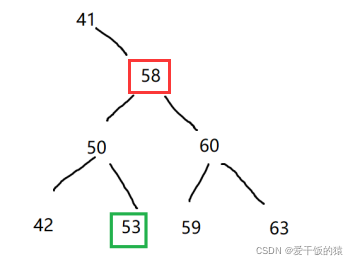这篇文章将为大家详细讲解有关Java如何实现二分搜索树,小编觉得挺实用的,因此分享给大家做个参考,希望大家阅读完这篇文章后可以有所收获。
1.概念
a.是个二叉树(每个节点最多有两个子节点)
b.对于这棵树中的节点的节点值
左子树中的所有节点值 < 根节点 < 右子树的所有节点值
二分搜索树中一般不考虑值相等的情况(元素不重复)JDK中的搜索树就不存在相同的值(TreeMap-key)

最大特点:也是判断是否是搜索树的方法
对该树进行中序遍历,就可以得到一个升序集合0 1 2 3 4 5 6 7 8 9
在一个有序区间上进行二分查找的时间复杂度? logn不断将集合/2/2 / 2 ==1为止logN
logN =》联想到"树"
2.重点操作

当删除58时,此节点左右子树都不为空
Hibbard Deletion 1962
在BST中删除一个左右子树都存在的节点
找到当前以58为根节点的前驱或者后继节点作为删除后的新节点
前驱:在以58为根的BST中最后一个小于58的节点->53
后继:在以58为根的BST中第一个大于58的节点->59
当我们使用后继节点时,先连removeMin(root.right),在连root.left
TreeNode successor = findMin(root.right);successor.right = removeMin(root.right);successor.left = root.left;3.完整代码
import java.util.NoSuchElementException; public class BST { private class TreeNode{ private int val; private TreeNode left; private TreeNode right; public TreeNode(int val) { this.val = val; } } private int size; private TreeNode root; public void add(int val){ root = add(root,val); } private TreeNode add(TreeNode root, int val) { if(root == null){ //创建一个新节点 TreeNode newNode = new TreeNode(val); size++; return newNode; } //左子树插入 if(val < root.val){ root.left = add(root.left,val); } //右子树插入 if(val > root.val){ root.right = add(root.right,val); } return root; } public boolean contains(int val){ return contains(root,val); } private boolean contains(TreeNode root, int val) { if(root == null){ return false; } if(val == root.val){ //找到了 return true; }else if(val < root.val){ //递归左子树查找 return contains(root.left,val); }else{ //递归右子树查找 return contains(root.right,val); } } public int findMin(){ //判空 if(root == null){ //抛出一个空指针异常 throw new NoSuchElementException("root is empty! cannot find min"); } TreeNode minNode = findMin(root); return minNode.val; } private TreeNode findMin(TreeNode root) { //当此节点左子树为空,说明此节点是最小值 if(root.left == null){ return root; } //递归访问左子树 return findMin(root.left); } public int findMax(){ //判空 if(root == null){ throw new NoSuchElementException("root is empty! cannot find max"); } TreeNode maxNode = findMax(root); return maxNode.val; } private TreeNode findMax(TreeNode root) { //当此节点右子树为空,说明此节点是最大值 if(root.right == null){ return root; } //递归访问右子树 return findMax(root.right); } public int removeMin(){ int min =findMin(); root = removeMin(root); return min; } private TreeNode removeMin(TreeNode root) { if(root.left == null){ TreeNode right = root.right; //找到最小值,删除节点 root = root.left = null; size--; return right; } root.left = removeMin(root.left); return root; } public int removeMax(){ int max = findMax(); root = removeMax(root); return max; } //在当前以root为根的BST中删除最小值所在的节点,返回删除后的树根 private TreeNode removeMax(TreeNode root) { if(root.right == null){ TreeNode right = root.right; //找到最大值,删除节点 root = root.right = null; size--; return right; } root.right = findMax(root.right); return root; } public void removeValue(int value){ root = removeValue(root,value); } private TreeNode removeValue(TreeNode root, int value) { if(root == null){ throw new NoSuchElementException("root is empty! cannot find remove"); }else if(value < root.val){ root.left = removeValue(root.left,value); return root; }else if(value > root.val){ root.right = removeValue(root.right,value); return root; }else { //此时value == root.value if(root.left == null){ //删除最小数 TreeNode right = root.right; root = root.right = null; size--; return right; } if(root.right == null){ //删除最大数 TreeNode left = root.left; root = root.left =null; size--; return left; } //找到当前该删除节点的前驱或者后继节点作为删除后的新节点 //当我们使用后继节点时,先连removeMin(root.right),在连root.left TreeNode successor = findMin(root.right); successor.right = removeMin(root.right); successor.left = root.left; return successor; } } @Override public String toString() { StringBuilder sb = new StringBuilder(); generateBSTString(root,0,sb); return sb.toString(); } //直观打印,可以看到树的深度 private void generateBSTString(TreeNode root, int height, StringBuilder sb) { if(root == null){ sb.append(generateHeightString(height)).append("NULL\n"); return; } sb.append(generateHeightString(height)).append(root.val).append("\n"); generateBSTString(root.left,height+1,sb); generateBSTString(root.right,height+1,sb); } private String generateHeightString(int height) { StringBuilder sb = new StringBuilder(); for (int i = 0; i < height; i++) { sb.append("--"); } return sb.toString(); }}关于“Java如何实现二分搜索树”这篇文章就分享到这里了,希望以上内容可以对大家有一定的帮助,使各位可以学到更多知识,如果觉得文章不错,请把它分享出去让更多的人看到。




